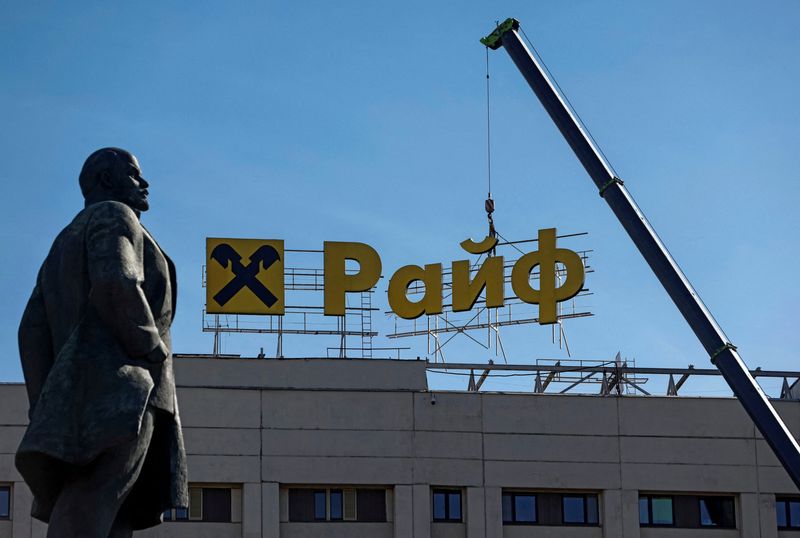By John O'Donnell and Alexandra Schwarz-Goerlich
VIENNA (Reuters) - Raiffeisen Bank International (VIE:RBIV) is delaying plans to leave Russia, three people familiar with its position said, as Austria steps up its defence of long-standing ties with Moscow.
Raiffeisen (RBI), the largest of the Western banks in Russia, had intended to spin off its Russian business, which provides a payments lifeline to hundreds of companies there, by September after coming under pressure from European regulators.
Austria and RBI, which is also at the centre of a U.S. inquiry over its Russian links, are resisting this in the hope that the war in Ukraine will end soon, the people told Reuters.
Austrian officials, meanwhile, are stepping up their defence of RBI in Europe and Washington, saying that it has been unfairly singled out, two people with knowledge of government thinking said, testing Western resolve to isolate Moscow.
Although Austria publicly supports Ukraine, several officials who spoke to Reuters said they were reluctant to completely sever decades-old ties with Russia, thinking it will still be possible to restore relations.
RBI has not yet outlined its plan to supervisors at the European Central Bank (ECB), two people with knowledge of its dealings with the central bank said, making a spin-off unlikely by September.
The bank wants to wait for ECB approval before asking its shareholders for a green light, said two of the people familiar with its position, which could take months.
Furthermore, the approval of Russia's central bank, finance ministry and, in the event of a sale, even Russian President Vladimir Putin, will be needed before RBI acts.
Russian authorities made it clear to RBI, which has around 2,600 corporate customers, 4 million local account holders and 10,000 staff, that they wish it to stay because it enables international payments, said one of the people.
An RBI spokesperson said it will continue to pursue a sale or spin-off and was committed to reducing its Russian business.
However, RBI's slow pace has fuelled a row with the ECB, which supervises the bank and has pushed for it and others such as UniCredit to quit Russia. The Italian bank declined to comment further on its plans.
The ECB urged RBI not to pay a dividend this year because of its concerns over Russia, one of the people said.
RBI is also examining a sale as an alternative to unlock the up to 4 billion euros of capital tied up in the profitable Russian arm.
However, uncertainty triggered by last month's Wagner group march on Moscow will make it harder to find a buyer because the event has shaken Russia's business elites, said that person.
LONG-STANDING TIES
Key Austrian officials are fighting RBI's corner and redoubling efforts to rebuff pressure on the bank, which is part of an industrial combine that underpins the country's economy.
RBI's presence underlines the depth of relations between Austria and Russia, which maintain close ties through Russian gas pipelines and finance, with Vienna a hub for cash from Russia and its former Soviet neighbours.
Austrian central bank Governor Robert Holzmann raised concerns over pressure on the bank with ECB President Christine Lagarde, one person with knowledge of those discussions said.
Austria's central bank and the ECB declined to comment.
Raiffeisen also faces pressure from Washington and has handed over data about Russian transactions to the United States' sanctions authority - the Treasury Department's Office of Foreign Assets Control (OFAC), three people with knowledge of the inquiry told Reuters.
One of those people said this information posed a threat if any sanctions breaches were discovered. Raiffeisen said it complied with sanctions and was cooperating with OFAC.
In mid-June, Austria's finance minister, Magnus Brunner, spoke with the top U.S. Treasury sanctions official, Brian Nelson, underscoring cooperation, a person with knowledge of the matter said.
Another source said he has urged the U.S. not to pressure RBI.
A spokesperson for Austria's finance ministry said other European banks were also active in Russia.

"A bank cannot leave a country like that overnight," said the spokesperson, who criticised what he described as the pretence that Austria was an exception.
RBI's presence in Russia has proved divisive within its management as well as among the regional Landesbanks that control the group, with some advocating it leaves.